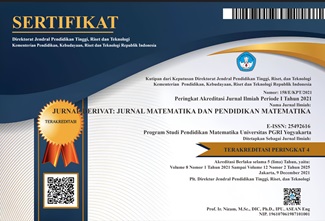Pengaruh Kecemasan Matematika Siswa Kelas VII Terhadap Hasil Belajar Di SMP Negeri 3 Kota Bengkulu
DOI:
https://doi.org/10.31316/j.derivat.v7i2.1050Abstract
This research is a study that discusses the influence of mathematics on grade VII students—learning outcomes at SMP NEGERI 3 Kota Bengkulu. This study's population was all students of class VII SMP NEGERI 3 Bengkulu City, which consisted of 130 famous students in 5 classes. Samples were taken using the random sampling technique. Then, a sample of class VII.2 was chosen, possibly 20 students. This study using a questionnaire and documentation. The data were obtained using a questionnaire, while the documentation in this study was used to obtain learning data obtained from teacher data in the form of daily math test scores. In the research analysis, prerequisite tests were used, such as the normality test, linearity test, and product moment test with SPSS version 22. The analysis results obtained a value of 0.754, which indicates that the relationship's level is healthy between the two variables. There is a positive sign indicating that the property is valuable. Positive and unidirectional. The results of the analysis using Pearson products when the significance value was obtained 0.000. The results of this study indicate that there is a significant relationship between the effect of mathematics on learning outcomes at SMP NEGERI 3 Kota Bengkulu.
Keywords: Mathematics anxiety, learning outcomes
References
Afandi, A. (2018). Difference of learning mathematics between open question model and conventional model. Malikussaleh Journal of Mathematics Learning (MJML), 1(1), 13-18. https://doi.org/10.29103/mjml.v1i1.620
Afiatman, N. H., Hafiludin, S., Anggo, M. (2019). Pengaruh Kecemasan Matematika Terhadap Hasil Belajar Matematika Ditinjau Dari Gaya Belajar Siswa Kelas VIII SMP Negeri 4 Kendari. Jurnal Penelitian Pendidikan Matemat ika, 7(3). http://ojs.uho.ac.id/inde x.php/JPPM
Ajogbeje, & James, O. (2013). Effects of Gender, Mathematics Anxiety and Achievement Motivation on Colle-ge Students’ Achievement in Math-ematics. International Journal of Education & Literacy Studies,1 (1). http://dx.doi.org/10.7575/aiac.ijels.v.1n.1p.15
Ekawati, A. (2015). Pengaruh Kecemasan Terhadap Hasil Belajar Mate-matika Siswa Kelas VII SMPN 13 Banjarmasin. Math Didactic: Jurnal Pendidikan Matematika, 1(3).http://jurnal.stkipbjm.ac.id/index/php/math/search
Herbst, P. G. (2003). Using novel tasks in teaching mathematics: Three tensions affecting the work of the teacher. American Educational Research Journal, 40(1), 197-238.
Irfan, M. (2017). Analisis Kesalahan Siswa dalam Pemecahan Masalah Berdasarkan Kecemasan Belajar Matematika. Jurnal Matematika Kreatif-Inovatif, 8 (2), 143-14. http://dx.doi.org/10.15294/kreano.v8i2.8779
Kargar, M., Tarmizi, A. R., Bayat, S. (2010). Relationship between Mathematical Thinking, Mathematics Anxiety and Mathematics Attitudes among University Students. International Conference on Mathematics Education Research 2010 (ICMER 2010) . 8 (2010) 537–542. doi:10.1016/j.sbspro.2010.12.074. www.sciencedirect.com
Lebens, M., Graff, M., & Mayer, P. (2010). The affective dimensions of mathematical difficulties in schoolchildren. Education Research International, 2011. Doi: 10.1155/2011/487072
Lyons, I. M., & Beilock, S. L. (2012). When Math Hurts: Math Anxiety Predicts Pain Network Activation In Anticipation Of Doing Math. PloS one, 7(10), e48076. Doi : 10.1371/journal.pone.0048076
Mutawah, M. A. (2015). The Influence of Mathematics Anxiety in Middle and High School Students Math Achievement. International Education Studies, 8(11). http://dx.doi.org/10.5539/ies.v8n11p239
Putriani, D & Rahayu, C. (2018). The Effect of Discovery Learning Model Using Sunflowers in Circles on Mathematics Learning Outcomes. International Journal of Trends in Mathematics Education Research, 1(1), 22-25. http://dx.doi.org/10.33122/ijtmer.v1i1.26
Syafri, F. S. (2017). Ada apa dengan kecemasan matematika?. Journal of medives: journal of mathematics education IKIP Veteran Semarang, 1(1), 59-65.
Sembiring, M. A., Sibuea, M. F. L., & Sapta, A. (2018). Analisa Kinerja Algoritma C.45 dalam Memprediksi Hasil Belajar. Journal of Science and Social Research, 1(1), 73–79.
Smail, L. (2017). Using Bayesian Networks to Understand Relationships among Math Anxiety, Genders, Personality Types, and Study Habits at a University in Jordan. Journal on Mathematics Education, 8(1) , 17-34.
Sofiatun, S., Sampoerna, P. D., Hakim, L. E. (2018). The effect of scaffolding techniques on the ability of student’s reasoning ability and mathematics anxiety reviewed from gender. Unnes Journal of Mathematics Education, 7(1), 63-71. doi: 10.15294/ujme.v7i1.22574
Sugiyono. (2015). Metode Penelitian Pendidikan, Pendekatan Kuantitatif Kualitatif dan R&D. Bandung: Alfabeta.
Tinungki, G. M. (2015). The Role of Cooperative Learning Type Team Assisted Individualization to Improve the Students' Mathematics Communication Ability in the Subject of Probability Theory. Journal of Education and Practice, 6(32), 27-31. https://iiste.org/journals/index.php
Yadrika, G. (2019). Think-Talk-Write: Strategi untuk Meningkatkan Hasil Belajar Matematika Siswa. JNPM (Jurnal Nasional Pendidikan Matematika). http://dx.doi.org/10.33603/jnpm.v3i2.1995
Yuliza, N. (2019). Pengaruh Kecemasan Matematika terhadap Hasil Belajar Peserta Didik Kelas VIII SMP Muhammadiyah Terpadu Kota Bengkulu, Seminar Nasional Tadris (Pendidikan) Matematika. http://prosiding.iaincurup.ac.id/index.php/cacm
Downloads
Published
Issue
Section
Citation Check
License
Authors who publish with this journal agree to the following terms:
-
Authors retain copyright and grant the journal right of first publication with the work simultaneously licensed under a Creative Commons Attribution-ShareAlike 4.0 International License that allows others to share the work with an acknowledgment of the work's authorship and initial publication in this journal.
- Authors are able to enter into separate, additional contractual arrangements for the non-exclusive distribution of the journal's published version of the work (e.g., post it to an institutional repository or publish it in a book), with an acknowledgment of its initial publication in this journal.
- Authors are permitted and encouraged to post their work online (e.g., in institutional repositories or on their website) prior to and during the submission process, as it can lead to productive exchanges, as well as earlier and greater citation of published work (See The Effect of Open Access).







